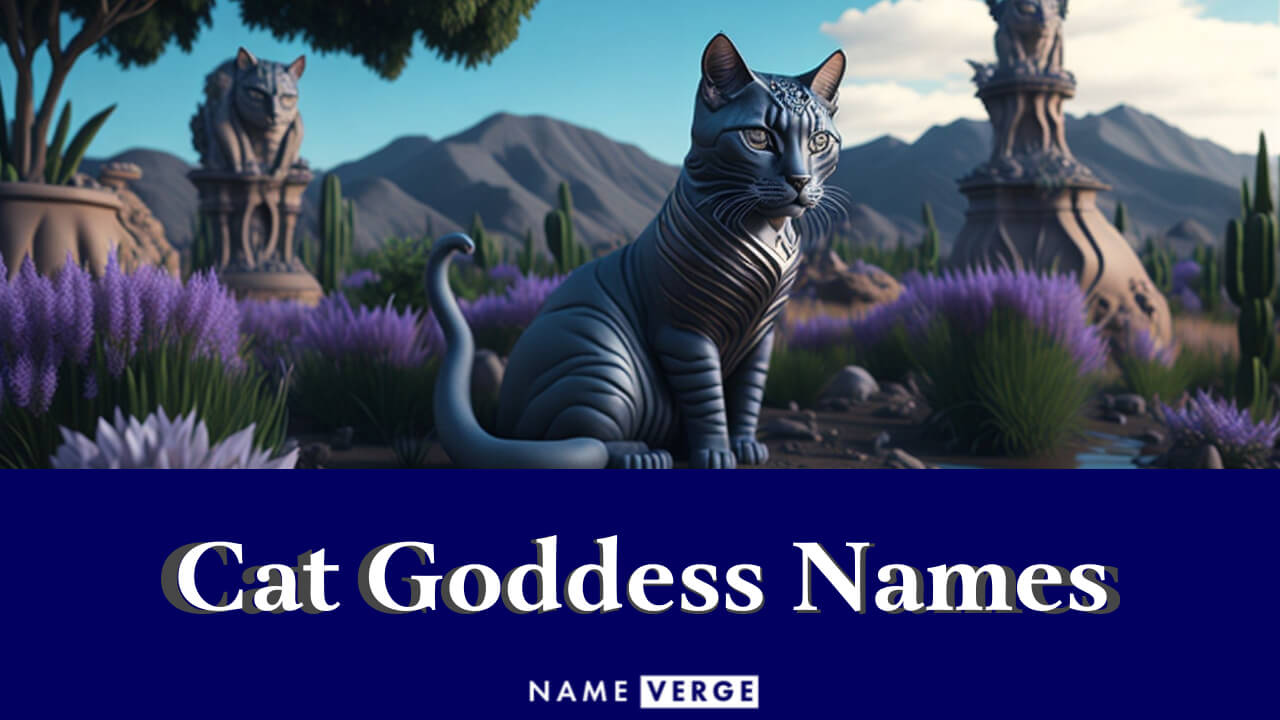Cat Goddess Names: Welcome, fellow cat lovers! If you’ve embarked on the exciting journey of naming a new feline, you’re in the right place.
Lingering on your chair, you realize choosing a name for your cat is as delicate as picking a name for a child.
One look at your cat’s eyes, the comfort she finds in the smallest corners of your home, and you know a mundane name won’t fit.
How about a divine name, a name fitting a goddess? Well, pet parents and cat enthusiasts, you’re in luck!
In this article, we have our list of cat goddess names, drawn from several world mythologies.
If you want a name that embodies strength, grace, and mystery for your cute feline, your quest ends here!
You’re bound to meet a name that embraces the divine traits of your cat. Twist the key and unlock the magical realm of cat goddess names.
Egyptian Cat Goddess Names
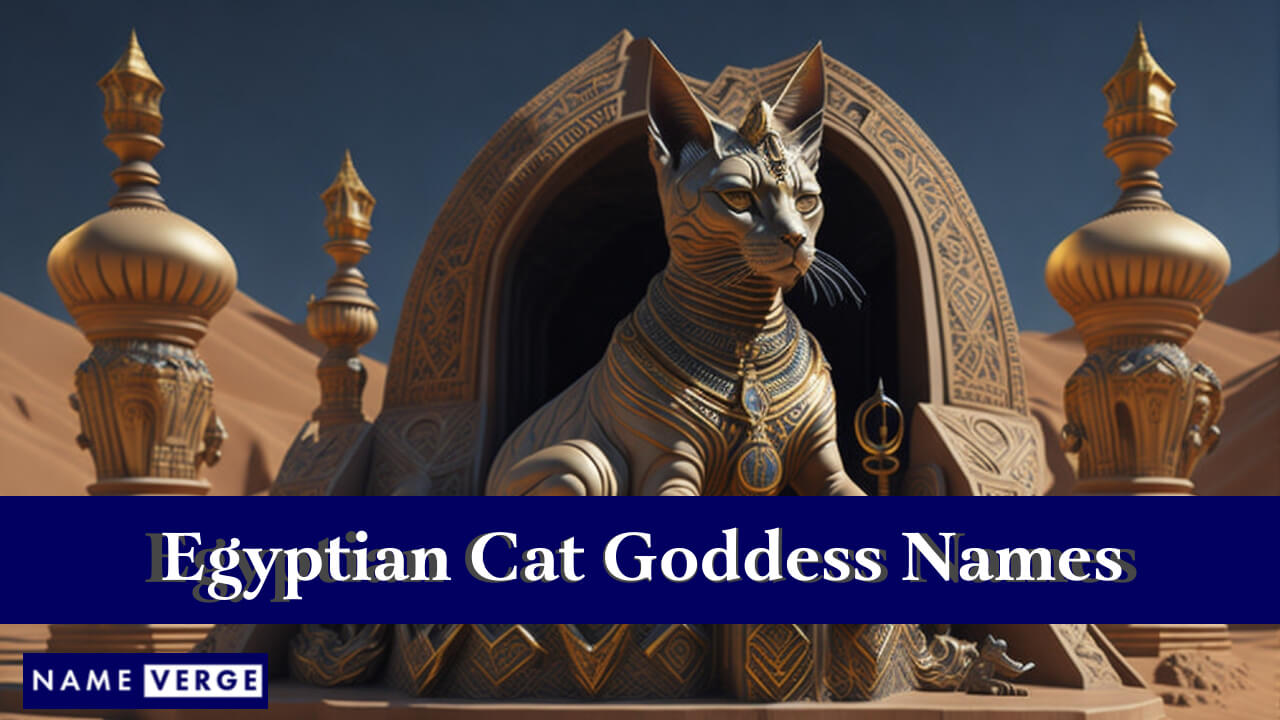
Egypt, known for its rich history, is a goldmine for names drawn from mythology where cats were divine.
Thinking about a Sphinx or a graceful cat in Ancient Egyptian art will connect you and your cat to those times.
Cats were sacred in Ancient Egypt, worshipped by several goddesses with their attributes.
An Egyptian cat goddess’s name reflects the beauty, power, and sacredness of your feline.
These names introduce history, culture, and divine power, perfect for your royal cat.
Immerse yourself in the powerful goddess names that exemplify the same elegance and majesty your cat displays each day.
Delve into this fascinating lore and uncover our list of Egyptian cat goddess names for your cat.
- Bastet: The Egyptian goddess of home, family, and protection, often portrayed as a lioness or as a woman with the head of a lioness or a domestic cat.
- Sekhmet: This goddess was known as “the Powerful One.” She represents Upper Egypt and is the fierce counterpart of the gentler Lower Egyptian goddess, Bastet.
- Mafdet: The first feline deity in Egyptian mythology, often depicted as a woman with a lioness head, she was the defender against poisonous animals and the protector of the pharaoh’s sacred power.
- Hathor: Known as “the Great One of Many Names,” Hathor encompasses many roles including being the mother of the sun god, Ra, and a sky goddess.
- Isis: A goddess who wears many hats: motherhood, magic, and being a wife, she is known for her protection and healing abilities.
- Tefnut: Considered the goddess of rain, dew, moisture, and fertility, Tefnut represents the element of water.
- Wadjet: Known as the “Green One,” Wadjet is a protective deity who repels evil and keeps the pharaoh safe.
- Djehuty: Another name for the god Thoth, representing the moon, wisdom, writing, hieroglyphs, science, magic, and art.
- Anuket: The goddess of the Nile and the cataracts, Anuket is known as “the embracer.”
- Pakhet: Often depicted with a lioness’s head, Pakhet is the goddess of motherhood and warfare.
- Satis: The goddess of the Nile’s annual flooding, Satis is also associated with fertility and the hunt.
- Anput: Wife of the jackal-headed god Anubis, Anput is frequently seen as a woman wearing a standard topped with a jackal, or simply as a jackal.
- Aker: The god of the earth and the horizon, Aker symbolizes where the sun rises and sets.
- Shai: The god of fate and destiny, Shai was present during the weighing of the heart ceremony in the afterlife.
- Sefkhet: Goddess of writing, historical records, accounting, and mathematics.
- Neith: Warrior goddess of the hunt, she is also associated with weaving and wisdom.
- Mut: An ancient mother goddess associated with new beginnings, Mut has been worshiped as the Mother of the Gods.
- Amentet: Deity associated with the underworld, Amentet personifies the desert lands west of the Nile Valley where the Egyptians would bury their dead.
- Nephthys: Known as the “Lady of the House,” Nephthys is associated with the home, motherhood, and protection.
- Serqet: Primarily known as a goddess of healing poisonous bites and stings, Serqet is seen as a protector against venomous creatures.
- Nekhbet: Vulture goddess who was a protector of the Pharaoh and Upper Egypt, often paired with Wadjet, the cobra goddess.
- Edjo: Another name for Wadjet, the goddess of lower Egypt.
- Seshat: The goddess of wisdom, knowledge, and writing. She was seen as a scribe and record keeper.
- Ma’at: Goddess of truth, harmony, and balance. She represented the moral order that both the earthly and divine realms had to follow.
- Berenice: A constellation named after Queen Berenice II of Egypt who according to legend, sacrificed her hair to the gods for her husband’s safe return from war.
- Iunu: Sacred to the god Atum, the creator god, this is ancient Heliopolis now known as Cairo.
- Meretseger: Known as “she who loves silence,” Meretseger was the cobra-goddess of tomb builders and protector of the tombs in the Valley of the Kings.
- Hemsut: Goddess of fate and destiny.
- Anhur: Also known as Onuris, the sky god known as “He Who Leads Back the Distant Goddess.”
- Selket: Scorpion goddess who protects against poisonous bites and was said to cure venomous stings.
- Komash: Goddess of childbirth and protector of children and nursing mothers.
- Imshi: Locally worshipped lioness goddess.
- Nebti: Also known as Nebet, she is the vulture goddess, the protector of Upper Egypt.
- Neferti: Meaning “Beautiful Woman,” she was a minor goddess associated with beauty and femininity.
- Taurt: Protective and nurturing goddess, depicted as a pregnant hippopotamus.
- Kahet: A minor goddess of the sunrise, whose name means ‘Sky Embracer.’
- Anpu: Alternate spelling for Anubis. The directory of souls and divine embalmer.
- Hator: A minor protective goddess.
- Qadesh: A goddess of sacred ecstasy and sexual pleasure.
- Qetesh: Another name for Qadesh; often worshipped as a nature goddess.
- Raet: Female sun goddess and counterpart to the sun god, Ra.
- Shai: Known as the god of fate and destiny.
- Tawaret: Goddess who protected women during pregnancy and childbirth.
- Wosret: Locally worshipped Theban goddess of royalty, often seen with a was-scepter.
- Nema: Warrior goddess, also known as the Lady of the Shield.
- Anubis: The jackal-headed god associated with mummification and the afterlife.
- Sehti: Minor goddess of Upper Egypt.
- Sati: Sky goddess in Heliopolis mythology, associated with the border between Egypt and Sudan.
- Shenti: Locally worshipped crocodile goddess.
- Heket: Known as a frog goddess, she was one of the deities of childbirth and resurrection.
Greek Cat Goddess Names
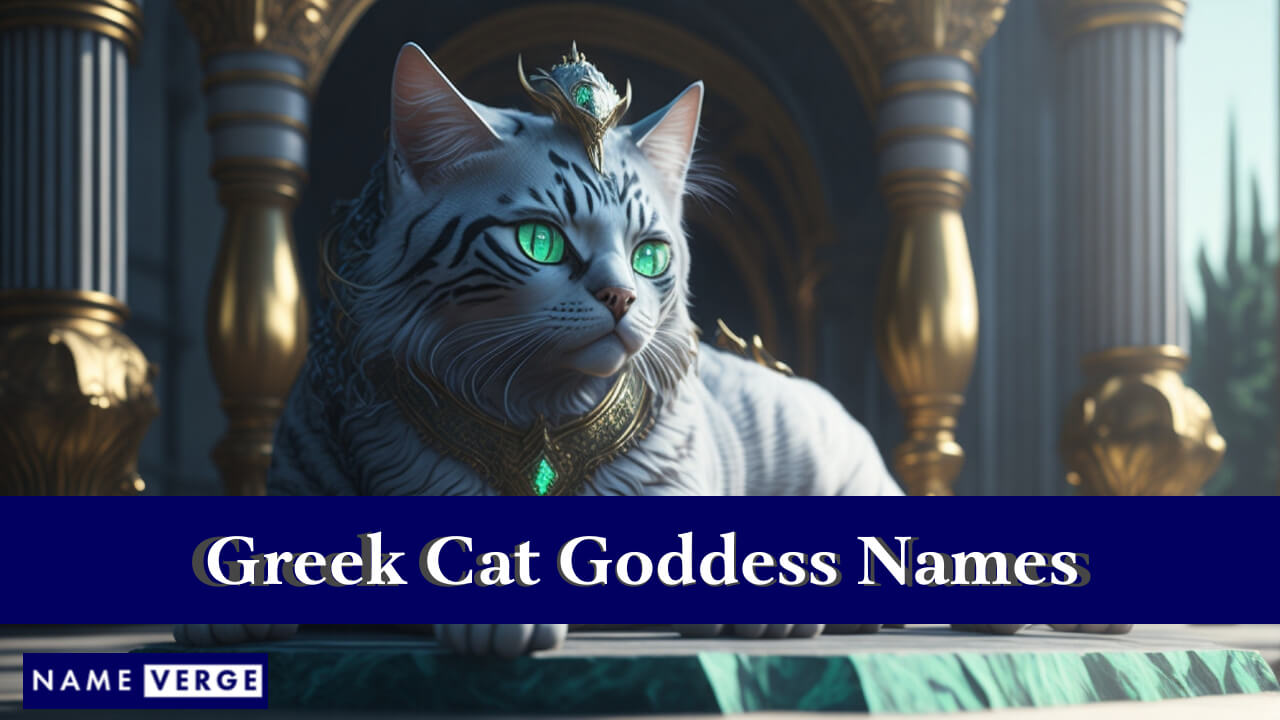
Greek mythology is a trove filled with powerful goddesses, making it a great source for cat names.
From Athena, the goddess of wisdom, to Artemis, the huntress, Greek goddess names have a unique appeal.
Let your cat carry the heritage of Greek mythology with a name embodying wisdom and strength.
Your cat’s personality traits are captured in these alluring Greek cat goddess names.
Names drawn from Greek mythology serve as a testament to your cat’s divine persona.
Feel the magic of mythology waft through your home as you call out a divine name, resonating with grace.
Dive into our list of Greek cat goddess names, each offering a slice of the glorious ancient world.
- Athena: Known as the goddess of wisdom, courage, inspiration, civilization, law, and justice, Athena is also associated with warfare strategies.
- Aphrodite: The goddess of beauty, love, desire, and fertility.
- Artemis: The goddess of the hunt, wilderness, and animals especially known for her association with the moon and chastity.
- Hera: Known as the goddess of women, marriage, family, and childbirth.
- Demeter: The goddess of agriculture, harvest, growth, nourishment, and the seasons.
- Persephone: She is the queen of the underworld and wife of Hades, associated with the changing of the seasons.
- Hestia: Known as the goddess of the hearth, home, domesticity, and family.
- Hebe: The goddess of youth, also known as the cupbearer of the gods serving ambrosia.
- Nike: The goddess of victory, often seen alongside Zeus, Athena, and Apollo.
- Eileithyia: The goddess of childbirth and midwifery.
- Nemesis: The goddess of retribution and revenge, especially for hubris towards the gods.
- Eris: Known as the goddess of discord, strife, and chaos.
- Iris: The goddess of the rainbow and messenger of the gods.
- Tyche: The goddess of luck, fortune, and prosperity.
- Eos: Known as the goddess of the dawn.
- Selene: The goddess of the moon.
- Hecate: The goddess of magic, crossroads, witchcraft, and necromancy.
- Gaia: The goddess of the Earth, and mother of the Titans.
- Theia: Titaness of sight and the shining light of the clear blue sky.
- Rhea: The Titaness of fertility and motherhood, known as the “Mother of Gods.”
- Themis: The Titaness of divine law, order, and customs.
- Mnemosyne: The Titaness of memory and the inventor of words.
- Dione: A Titaness and ocean nymph, often associated with the oracle of Dodona.
- Metis: Titaness of wisdom, craft, and skill. She was the first wife of Zeus.
- Eurynome: The Titaness of meadows and mother of the Charites.
- Thalia: One of the nine Muses, Thalia is the Muse of comedy and pastoral poetry.
- Calliope: The Muse of epic poetry and eloquence.
- Clio: Known as the Muse of History.
- Euterpe: The Muse of music and lyric poetry.
- Erato: The Muse of Love Poetry.
- Melpomene: Originally the Muse of chorus, later becoming the Muse of tragedy.
- Polyhymnia: The Muse of sacred poetry, sacred hymns, and eloquence.
- Terpsichore: Known as the Muse of dance and chorus.
- Urania: The Muse of astronomy and universal love.
- Perseis: Oceanid and mother of the witch Circe.
- Io: A mortal woman turned into a cow by Zeus, later to become the goddess of bestial fertility.
- Europa: A Phoenician woman in Greek mythology from whom the continent of Europe got its name.
- Electra: One of the seven Pleiades, an ocean nymph.
- Nereida: A sea nymph, daughter of Nereus, the old man of the sea.
- Doris: A sea nymph and wife of Nereus, representing the bounty of the sea.
- Thetis: A sea nymph and mother of the hero Achilles.
- Amphitrite: Known as the sea goddess and wife of Poseidon.
- Tethys: A Titaness and sea-goddess, the mother of rivers and clouds.
- Harmonia: The goddess of harmony and concord, daughter of Ares and Aphrodite.
- Kalypso: A nymph who lived on the island of Ogygia, where she detained Odysseus for several years.
- Leto: Titaness of modesty and kindness, and mother of the twin deities Apollo and Artemis.
- Alcyone: One of the Pleiades, mother of the King of Thessaly by Poseidon.
- Maia: The eldest of the Pleiades, mother of Hermes by Zeus.
- Taygete: A mountain nymph and one of the Pleiades, associated with the mountains of the Peloponnese.
- Merope: The youngest of the Pleiades, she was known to be modest and shy, often faded from view, and linked to humans more than any other Pleiades.
Norse Cat Goddess Names
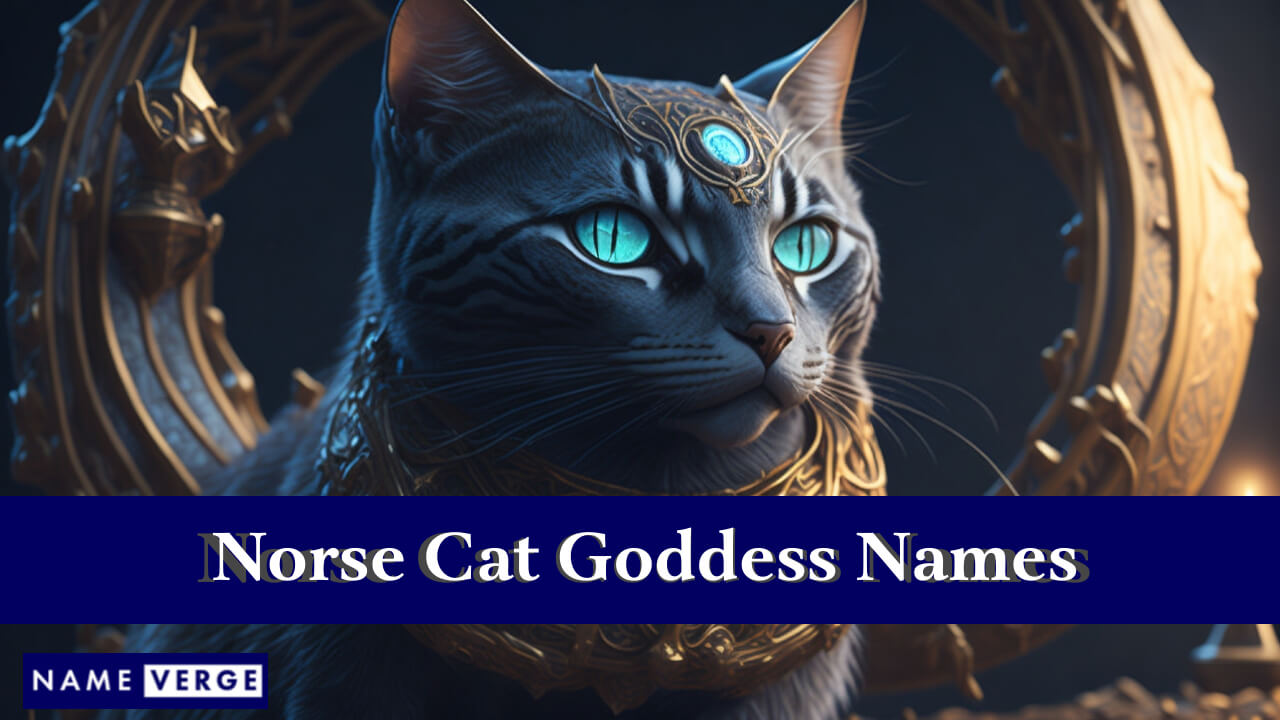
Does your feline hold an aura of the wild? Names drawn from the Norse gods embodying strength and love for cats will suffice.
The goddess of love and beauty, famous for her passion for cats, would make a perfect fit for your feline queen.
Does your cat have a calming presence, always grounding you after a long day? Or she has an untamed spirit, ruler of her mountain (or shelf).
Why not consider honoring her traits with a goddess name from the tales of old Viking lore?
The fierce warrior Freyja or the magical Frigg, Norse goddess names reflect a blend of ferocity, mystery, and magical charm.
Every purr from your cat encapsulates the essence of a Norse goddess. These names pay tribute to Norse mythology.
Immerse yourself in our list of Norse cat goddess names, each echoing with mystique and might.
- Freyja: Known as the goddess of love, beauty, and fertility, also associated with war, death, and wealth.
- Frigg: Goddess of wisdom, foresight, marriage, and motherhood, wife of Odin.
- Sif: Known as the earth goddess and wife to the god Thor.
- Idun: The goddess associated with youth and rejuvenation, keeper of the apples of immortality.
- Gerd: An incredibly beautiful giantess, she’s the wife of the god Freyr.
- Skadi: The winter goddess and giantess of skiing, and mountains.
- Ran: Goddess of the Sea, known to capture sailors in her net.
- Hel: Ruler of the underworld named after her, depicted half-alive and half-dead.
- Nanna: The moon goddess, wife of Balder, and mother of Forseti.
- Lofn: The goddess of forbidden love.
- Sigyn: Wife of Loki, the trickster god, known for her loyalty and devotion.
- Eir: Goddess of healing and medicine.
- Gefjun: Known for her knowledge of the future, associated with ploughing, virginity, and prosperity.
- Sjofn: The goddess inspires human love.
- Vor: The goddess of wisdom, thoughtfulness, and attention, she is somewhat similar to the Greek goddess Athena.
- Aegir: God of the sea, known for his ale-brewing abilities.
- Var: Goddess of agreements and marital unions.
- Syn: Goddess of watchfulness and doorways, prevent undesirables from entering feasts.
- Elli: Goddess of old age, depicted as overcoming Thor in a wrestling match.
- Hnoss: The goddess of beauty and desire, daughter of Freyja and Odr.
- Angrboda: A giantess in the land of giants, known as the ‘bringer of sorrow’.
- Saga: Goddess of history and storytelling.
- Brynhild: A Valkyrie or warrior maiden who was cast into a deep sleep by Odin.
- Gullveig: A powerful, knowledgeable, and respected witch who was the cause of the first war.
- Huld: A sorceress often associated with witchcraft and magic.
- Gna: Messenger goddess who traveled the world delivering messages for Frigg.
- Rind: Goddess and a giantess, mother of Vali by Odin.
- Fulla: Frigg’s maiden who took care of Frigg’s footwear and had the role of her secret counsel.
- Grid: A giantess who gave Thor advice as well as some great magical items to use against Loki.
- Bil: Goddess who personified the waxing and waning moon.
- Hjuki: Accompanied by his sister Bil, Hjuki is associated with the phases of the moon.
- Laga: Personification of springs, wells, and youthfulness.
- Sol: The goddess of the sun who is swallowed every night by a wolf only to be reborn in the morning.
- Hlin: The goddess of protection and refuge in times of war.
- Hrim: A minor frost giantess who only features in one major tale in Norse myth.
- Ylg: Goddess of the hunt, often compared to Artemis from the Greek pantheon.
- Ljof: A minor goddess of protection.
- Svalin: The shield carried by Sol that keeps the Earth from getting too hot from the Sun.
- Hri: Goddess of frost and the cold.
- Inari: Although originally a Finnish goddess, Inari, a goddess of fertility, was welcomed into the Norse pantheon.
- Kolga: Daughter of Aegir and Ran, represents the cool wave.
- Yrsa: She is a tragic heroine in the Norse sagas.
- Thokk: Goddess or giantess who famously refused to weep for the death of Balder, keeping him in the Underworld.
- Nott: Goddess of the night, she rides around the sky on her horse.
- Skuld: One of the Norns, a goddess of destiny.
- Joro: Earth Goddess, known as the mother of Thor.
- Mengloth: Goddess who lives atop Lyfjaberg (Hill of Healing) surrounded by healing maidens.
- Hrimgerd: A giantess who fought fiercely with Atli, but lost and was turned into stone.
- Ogn: Goddess associated with the sea, particularly responsible for stormy weather at sea.
- Glod: A giantess who was the mother of nine giant maidens, all of whom fathered Heimdallr, the guardian of the gods.
Celtic Cat Goddess Names
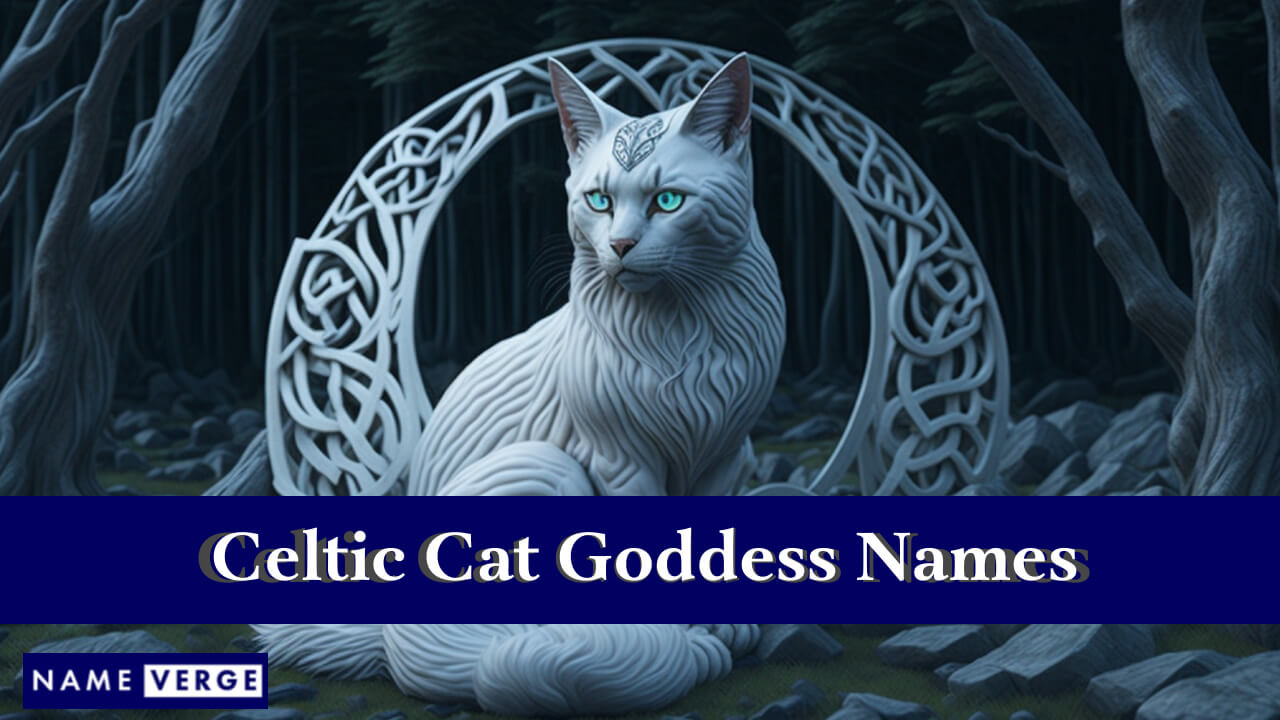
Celtic mythology, known for its tales and divine beings, offers a trove of names for your feline.
Cats in Celtic myths were considered magical, making these names a perfect fit for your cat.
It’s a world of gods and goddesses who govern everything, a perfect ground to unearth a good name for your feline.
Do you see your kitty’s behavior shift from playful to pensive, embodying the ever-changing nature?
Is she your source of comfort and healing, always mending your day with her calming purrs?
Or, her whims keep you on your toes, rendering her moods as fate itself. Somewhere in the tales of Celtic lore waits a name befitting your cat.
Dive into our list of Celtic cat goddess names, each carrying a touch of Celtic magic and divine mystique.
- Brigid: Goddess of spring, fertility, healing, poetry, and smithcraft.
- Morrigan: Known as the goddess of war, death, and fate, often appears as a crow.
- Cerridwen: Goddess of magic, wisdom, transformation, and rebirth.
- Rhiannon: Goddess associated with horses, and birds, and known for her perseverance.
- Aine: Goddess of wealth, sovereignty, and summer. Known for her vibrant energy and connection with the sun.
- Danu: Earth’s mother goddess of wisdom, water, and wind.
- Arianrhod: Goddess of the moon, stars, and sky. Known for her beauty she is associated with time, karma, and reincarnation.
- Epona: Protective goddess of horses, known throughout the Celtic and Roman world.
- Blodeuwedd: Goddess and maiden made of flowers, she’s also associated with wisdom, lunar mysteries, and the initiation.
- Sulis: Solar goddess of healing and thermal springs.
- Macha: A goddess of war, horses, and sovereignty. Sometimes considered an aspect of the Morrigan.
- Cliodna: Goddess of Beauty and the Otherworld, known as the Queen of the Banshees.
- Boann: River goddess, associated with the river Boyne in Ireland.
- Niamh: Known as the daughter of the sea god, she’s associated with beauty, brightness, and horses.
- Badb: One of the sisters of the Morrigan, goddess of prophecy, enlightenment, death, and inspiration.
- Bebhionn: Goddess of the Otherworld, representing the purity of the soul.
- Druantia: Queen of the Druids, associated with trees, love, and passion.
- Fand: Sea goddess who healed wounds and was known for her supernatural beauty.
- Nantosuelta: Goddess of nature, valley, streams, and abundance.
- Flidais: Goddess of beasts, woodlands, and sexuality.
- Sionnan: River goddess associated with the Shannon river.
- Scathach: Warrior goddess, often associated with Scotland, she taught martial arts.
- Tailtiu: Earth goddess, associated with fertility, agriculture, and sustenance.
- Fea: One of badb sisters, goddess of war.
- Aibell: Fairy Queen, guardian spirit, and the goddess of love and death.
- Aibh: Goddess of poetry, elegance, and beauty.
- Aisling: Represents dreams, vision, and aspiration.
- Anu: Mother goddess, symbolizing fertility, prosperity, and comfort.
- Aosidhe: Goddess of nature, beauty, grace, and charm.
- Arwen: Goddess of fertility, beauty, grace, and charm.
- Avonmora: Goddess of oceans and rivers, offering guidance during crossing over.
- Beag: Goddess of healing, magic, and life’s minimalist pleasures.
- Beira: Goddess of winter and the life force.
- Branwen: Goddess of love and beauty, associated with Ireland and Wales.
- Caer: Goddess of dreams, sleep, and prophecy.
- Cailleach: Hag goddess representing the winter season.
- Carman: The Celtic goddess of evil magic.
- Creiddylad: Goddess of flowers and love.
- Daire: Fertility goddess associated with sacred groves of oak trees.
- Damara: Goddess of fertility, spring, and youthful innocence.
- Deirdre: Tragic heroine, known for her beauty that caused men to go to war.
- Eilidh: Goddess of light and sun.
- Emer: Goddess associated with beauty, love, and wisdom.
- Etain: Another solar goddess associated with horses and water.
- Fionnuala: Known as a kind and beautiful fairy who symbolizes promise and new beginnings.
- Grian: Sun goddess, seen as the feminine sun and associated with healing and regeneration.
- Gwennolar: Herons are her sacred bird, associated with peace and tranquility.
- Isolde: Tragic heroine from the Cornish and Irish Arthurian sagas, represents enduring love.
- Lunantishee: Fairy protectors of blackthorn trees, associated with luck and wealth.
- Sheela-na-gig: Goddess of fertility and life, depicted as a carving of a woman revealing her vulva.
Japanese Cat Goddess Names
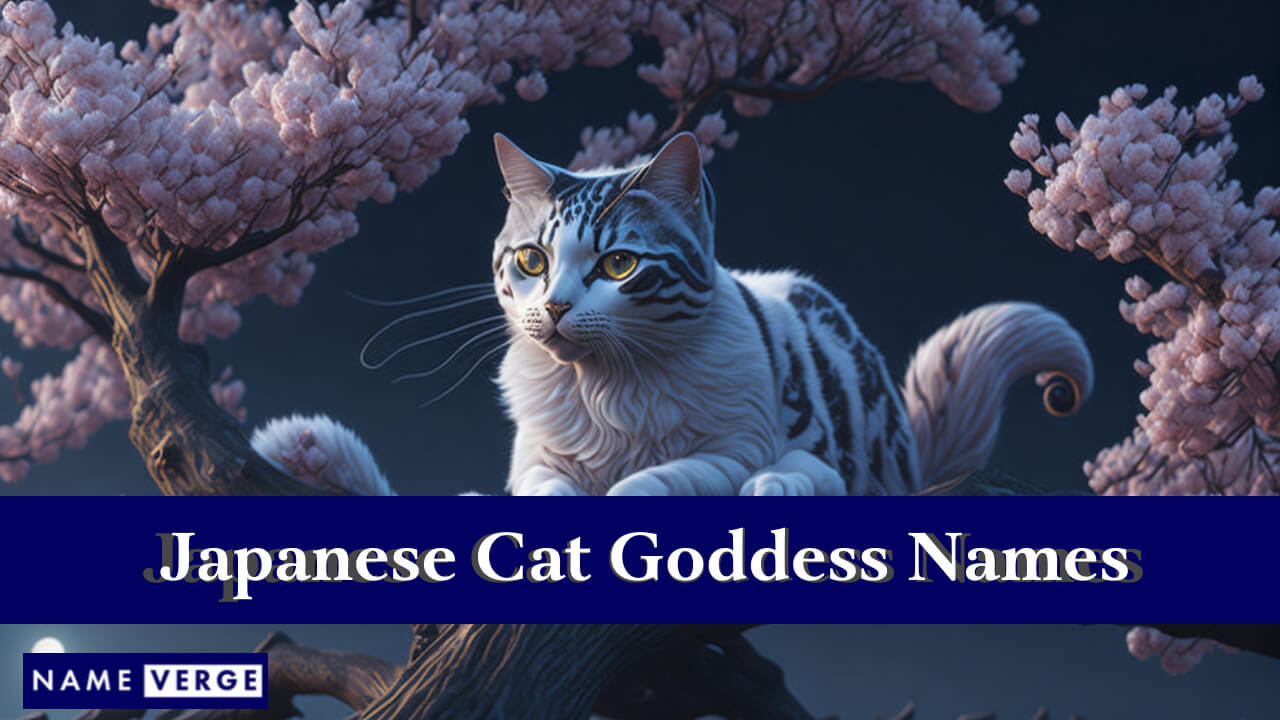
Japanese folklore and Shinto have divine beings, with many feline spirits and gods.
In Japanese culture, cats are seen as symbols of good fortune and prosperity.
Animated with a sense of beauty, Japanese mythology offers goddess names for your cat.
From Amaterasu, the sun goddess, to Uzume, the dawn goddess, the names exude elegance.
Giving your feline a Japanese cat goddess name infuses her with an air of mystique and magic.
Let her bear a name as pretty as cherry blossoms in spring. These names embody the beauty and divine essence of your feline.
Explore our list of Japanese cat goddess names echoing the grace of Japanese culture.
- Amaterasu: The sun goddess, the supreme deity in Shinto religion, and the ancestral deity of the Imperial family.
- Tsukuyomi: The moon god in Shinto and Japanese mythology.
- Benten: Goddess of beauty, wisdom, and wealth. Also known as Benzaiten.
- Uzume: Known as the goddess of joy and happiness, also associated with dance.
- Izanami: The goddess of creation and death, who together with her husband Izanagi, created the islands of Japan.
- Kishi: A guardian deity of roads and borders, often represented by a Shinto gate.
- Fujin: God of the wind, usually depicted with a bag of winds on his shoulders.
- Suijin: The Shinto god of water in Japanese mythology.
- Kishijoten: A goddess of beauty, fortune, and prosperity.
- Himeko: A princess goddess known for her honorable status.
- Konohana: Goddess of cherry blossoms and springtime.
- Kuni-No-Toko: God of the land, wealth, and farmers.
- Kushinada: A goddess who was saved from a terrible eight-headed serpent by the god Susanoo.
- Marishi-Ten: Goddess of the heavens, associated with light, sun, and the cosmos.
- Nakatsu: The deity of the middle world— the world of the living.
- Oho-Tomoe: God of war who is strong and brave in battle.
- Otohime: The dragon princess and goddess of the sea, married to a hunter of the land.
- Oyamatsumi: It’s the god of mountains, the sea, and war.
- Raijin: The god of lightning, thunder, and storms in Japanese mythology and the Shinto religion.
- Sarutahiko: A god of paths and crossings, and a leader of the earthly kami.
- Shina-To-Be: The patron god of agriculture and rice.
- Sumiyoshi: A collective name for the trio of gods that are worshipped at Sumiyoshi shrine.
- Susanoo: The Shinto god of the sea and storms, associated with the moon.
- Taka-Okami: The mountain god and god of rain.
- Uke-Mochi: The goddess of food and agriculture.
- Uso: The spirit of falsehoods, deceit, and lies.
- Wakahirume: The deity of dawn and weaving.
- Watatsumi: The dragon god of the sea.
- Yama-No-Kami: The spirit or kami of the mountain, worshipped in the Shinto faith.
- Yamanokuni: The god of the dark, the underworld, and the afterlife.
- Yatagarasu: The three-legged crow is the god of guidance.
- Yomotsu: The goddess of the underworld and death.
- Yuki-Onna: The snow woman, a spirit or yōkai in Japanese folklore.
- Kojin: The kami of fire, hearth, and the kitchen.
- Toyouke: The deity in charge of agriculture and industry.
- Tokoyo-Hime: She’s known as the goddess of eternity and agelessness.
- Chikap-Kamui: Ainu goddess of the earth or the wildlife on earth.
- Chimata-No-Kami: Pair of kami of crossroads and footpaths.
- Yayoi: Goddess of growth and development.
- Temman-Komo: Known as the heavenly grandchild god.
- Kotoshironushi: The god of things yet to be discovered.
- Oyuki: A snow goddess who fell in love with a human.
- Namazu: The mythological giant catfish that causes earthquakes.
- Jorojin: One of the Seven Lucky Gods, represents longevity.
- Inari: The kami of fertility, rice, agriculture, and industry.
- Kamado-No-Kami: The kami of kitchen and stoves.
- Tamayorihime: A sea goddess known as a gem or jewel maiden.
- Omoikane: The god of wisdom and intelligence.
- Mihashira: Known as the three pillars. They are worshipped as the patrons of blacksmiths and construction workers.
- Chidori: A thunder spirit, often shown as a bird.
Frequently Asked Questions About Cat Goddess Names
Embarking on a mystical journey to name your feline? In these FAQs, we have answered your queries about goddess names for cats.
What are cat goddess names?
Cat goddess names are derived from the names of goddesses in various mythologies around the world.
These names are used for female cats due to their divine, mystical, and powerful connotations.
What factors should I consider when picking a cat goddess name?
Consider your cat’s behavior, personality, physical characteristics, and your connection to the mythology you’re choosing from.
Also, ensure the name is one that you feel comfortable calling out and one you believe your cat will respond to.
Is it important to know the mythology behind the goddess name I pick for my cat?
It’s up to individual preferences, but knowing the mythology behind the name can add depth and significance to the name, and create a deeper bond between you and your feline friend.
Can I give my male cat a goddess name?
Names transcend gender and the choice of what you name your cat ultimately depends on you.
Does a goddess name make my cat special?
While a goddess name doesn’t inherently grant your cat any special powers, it can reflect the unique qualities that make your cat special to you.
Are goddess names for cats only associated with certain breeds?
Goddess names can be used for any breed of cat, and are not breed specific.
Are cat goddess names only from ancient mythologies?
While many cat goddess names are derived from ancient mythologies, you can find divine and mystical names in cultural and literary sources from any era.
Conclusion
So choosing a name for your feline is a remarkable experience, and it’s more than “naming.”
It’s capturing their essence and attempting to match the charisma that sets them apart from all other cats.
It’s celebrating the divine-like qualities we see in our cats, grace, independence, and mysteriousness.
These cat goddess names from various mythologies offer a blend of the divine and grace, like your cat.
Whether it’s for an Egyptian goddess, a Greek deity, or a Japanese divinity, these names resonate with their personalities.
Pick a name that resonates with you and watch your feline carry it with the dignity fitting a goddess.
Before you go, remember in the world of cats, every name carries its essence, defining your cat’s nature.
Don’t forget to share this post with fellow cat lovers. More power to the cats and their friends, who see the goddess within them. Until next time. Peace.

